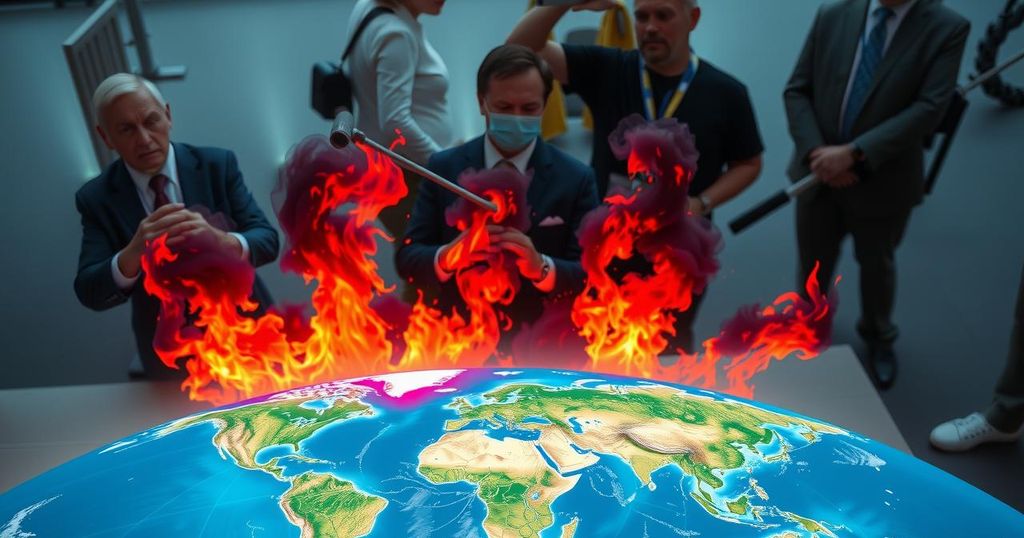COP29 concluded in Baku, Azerbaijan, amidst significant political dysfunction and inadequate climate commitments, overshadowed by the rise of populism and geopolitical tensions. As the world nears the critical 1.5°C threshold, the summit highlighted the urgent need for a reevaluation of global climate diplomacy. Although some commitments were made, the outcomes were deemed insufficient against the backdrop of mounting climate crises and the retreat of major powers from climate leadership.
The COP29 summit, concluded in Baku, Azerbaijan, has been characterized by significant shortcomings in political cooperation and climate commitments. Instead of fostering global solidarity against the escalating climate crisis, the summit reflected a stage for geopolitical tensions and a growing wave of populist disbelief in climate science. As the world races towards the catastrophic 1.5°C temperature threshold, nations exhibited an alarming inability to come together, particularly amid potent climate disasters, such as severe droughts and wildfires that have claimed lives and devastated environments around the globe.
The impact of populism on climate diplomacy became glaringly evident with the re-election of Donald Trump, whose skepticism towards climate action poses a serious threat to international agreements like the Paris Accord. Furthermore, Javier Milei’s abrupt withdrawal of Argentina from COP29 underscored the dangerous trend among populist leaders who prioritize short-term economic interests over long-term environmental challenges. This shift not only diminishes South America’s voice in climate negotiations but also emboldens similar perspectives held by others, such as Hungary’s Viktor Orban.
Geopolitical rivalries added another layer of difficulty at COP29. The host nation’s ties to fossil fuels, alongside diplomatic tensions, notably between Azerbaijan and France, compromised the credibility of the summit’s climate frameworks. Likewise, the complicated U.S.-China dynamic hindered concerted global efforts to tackle climate change due to conflicting national agendas, making it difficult to achieve shared climate finance commitments.
Despite these adversities, COP29 managed to produce some noteworthy agreements among over 200 nations, including a commitment to significantly increase climate finance for developing countries. However, such advancements are overshadowed by the inadequacies of current funding against the rising demands of vulnerable nations facing the dire impacts of climate inaction. Thus, the urgency of revamping global climate governance is paramount.
The urgency of the COP29 summit was amplified by a series of alarming climate-related events occurring globally. In 2023-2024, unprecedented droughts and heatwaves wreaked havoc, particularly in East Africa and India, resulting in severe human and ecological losses. The potential for the planet to exceed critical temperature thresholds heightened the importance of the summit, where discussions were initially aimed at fostering global cooperation to address climate change. However, the rise of populism and geopolitical disputes complicated this mission, severely limiting the ability of nations to reach meaningful agreements. Amid these challenges, the evolving dynamics shaped by both populism and national interests pose a significant threat to the progress of climate diplomacy and the collective efforts to combat climate change effectively.
In conclusion, COP29 serves as a stark reminder of the fragility of climate diplomacy in the face of rising populism and geopolitical divisions. As nations grapple with their climate commitments, it is crucial to restore trust and accountability in global climate governance. Looking forward, ongoing engagement by all stakeholders, including middle powers, cities, and the private sector, will be essential to overcome the current impasse and ensure that future climate summits deliver actionable outcomes. The success of COP30 in Brazil will ultimately depend on the collective willingness to prioritize long-term climate action over transient political ambitions.
Original Source: m.thewire.in







